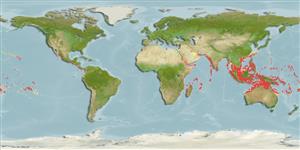Issue
Sphyraena nigripinnis Temminck & Schlegel, 1843 considered as valid in CofF (ref. 118474).
Environment: milieu / climate zone / depth range / distribution range
Écologie
marin récifal; profondeur 0 - 100 m (Ref. 89972). Tropical; 30°N - 24°S
Indo-Pacific: Persian Gulf (Ref.80050); Red Sea and East Africa to the central Indian Ocean and French Polynesia. Eastern Pacific: Mexico and Panama. The exact range is uncertain because of confusion with Sphyraena jello and Sphyraena putnamae (Ref. 9768).
Taille / Poids / Âge
Maturity: Lm ? range ? - ? cm
Max length : 170 cm TL mâle / non sexé; (Ref. 9710); common length : 80.0 cm TL mâle / non sexé; (Ref. 9768); poids max. publié: 7.1 kg (Ref. 40637)
Épines dorsales (Total) : 6; Rayons mous dorsaux (Total) : 9; Épines anales: 2; Rayons mous anaux: 7 - 9. Many dark bars crossing lateral line on body, each bar oblique in upper half, but nearly vertical in the lower; caudal fin largely blackish. No gill rakers on first arch; upper and lower gill arch with rough platelets, each platelet not bearing distinct spine.
Found near current-swept lagoon and seaward reefs (Ref. 9710). Feeds on fishes (Ref. 89972). Usually seen in large semi-stationary schools during the day (Ref. 9768) which have a tendency to occupy the same site for months or even years at a time. Probably disperses at night to feed (Ref. 1602). Often hooked by trolling between dusk and dawn (Ref. 37816). Minimum depth reported taken from Ref. 128797.
Life cycle and mating behavior
Maturities | Reproduction | Spawnings | Egg(s) | Fecundities | Larves
In general, barracudas in large numbers aggegate during spawning season and migrate to specific spawning areas (Ref. 240).
De Sylva, D.P. and F. Williams, 1986. Sphyraenidae. p. 721-726. In M.M. Smith and P.C. Heemstra (eds.) Smiths' sea fishes. Springer-Verlag, Berlin. (Ref. 5491)
Statut dans la liste rouge de l'IUCN (Ref. 130435)
Menace pour l'homme
Reports of ciguatera poisoning (Ref. 4537)
Utilisations par l'homme
Pêcheries: commercial; pêche sportive: oui
Outils
Articles particuliers
Télécharger en XML
Sources Internet
Estimates based on models
Preferred temperature (Ref.
123201): 26.1 - 29, mean 28.1 °C (based on 1626 cells).
Phylogenetic diversity index (Ref.
82804): PD
50 = 0.5000 [Uniqueness, from 0.5 = low to 2.0 = high].
Bayesian length-weight: a=0.00724 (0.00339 - 0.01546), b=2.92 (2.74 - 3.10), in cm total length, based on LWR estimates for this Genus-body shape (Ref.
93245).
Niveau trophique (Ref.
69278): 4.5 ±0.80 se; based on food items.
Résilience (Ref.
120179): Très faible, temps minimum de doublement de population supérieur à 14 ans (Preliminary K or Fecundity.).
Fishing Vulnerability (Ref.
59153): Very high vulnerability (90 of 100).
Nutrients (Ref.
124155): Calcium = 9.8 [4.8, 25.1] mg/100g; Iron = 0.241 [0.113, 0.501] mg/100g; Protein = 20.2 [18.2, 21.9] %; Omega3 = 0.0769 [, ] g/100g; Selenium = 47 [19, 118] μg/100g; VitaminA = 33 [7, 160] μg/100g; Zinc = 0.4 [0.3, 0.7] mg/100g (wet weight);
